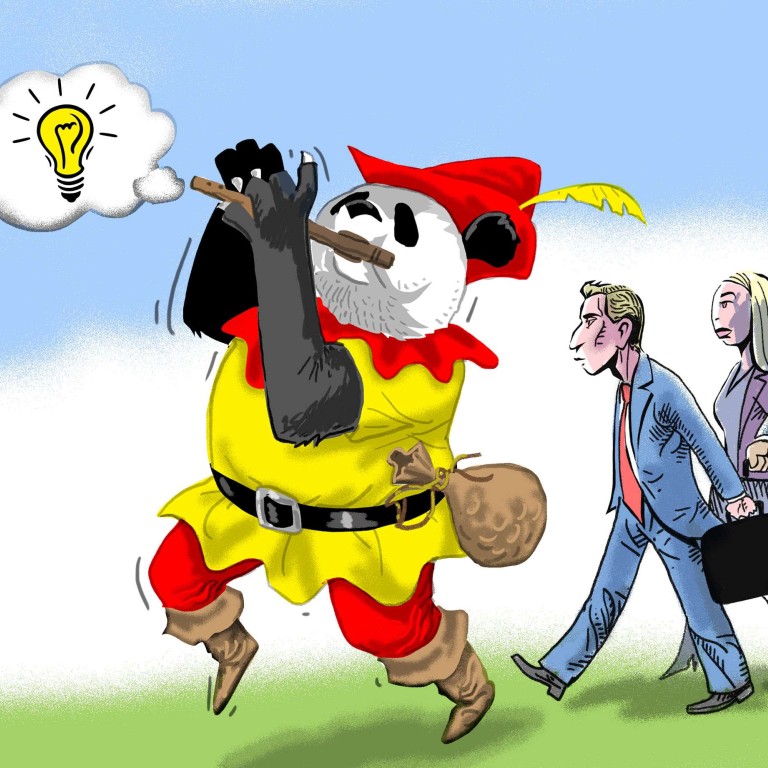
How China’s development story can be an alternative to the Western model
Yuen Yuen Ang says Beijing, now apparently seeking a global leadership role, should not be shy about sharing how it used a mix of direction and improvisation to spark growth

Today, the tables are turned. US President Donald Trump champions protectionism, threatening to rip up trade deals and penalise companies that move factories abroad.
President Trump could trip up, but not for the reasons liberals think
China’s eagerness to provide global leadership, at a time of US withdrawal, holds tremendous promise. China’s aspiration to lead the world, however, is still missing a crucial ingredient: ideas and norms about development that departs from the Western order.
In addition, China has become a major aid donor to countries in Africa and Latin America. Thus far, China’s growing presence in international development has concentrated on spending money and building large-scale infrastructure projects.

China’s road or the Western way: whose economic development model will prevail?
Perhaps reflecting its own repugnance of foreign intervention, China has deliberately avoided imposing norms of how development should be properly conducted elsewhere. Indeed, at the Davos meeting, Xi underscored that every nation should follow its own developmental path. In other words: China will provide money but not tell others what to do.
China certainly should not dictate to other countries ... Nevertheless, becoming a global leader does require that China do more than loosen its purse strings
China certainly should not dictate to other countries how they ought to develop their economies. Doing so would risk being imperialist, a charge that China itself has levelled against Western powers.
Nevertheless, becoming a global leader does require that China do more than loosen its purse strings. Its own reform experience, which has catapulted the country from abject poverty in the 1970s to a global powerhouse today, offers a powerful counter-narrative to Western-based norms of development.
The standard recipe of development is as follows: economic and political freedoms go hand in hand, so in order for poor countries to prosper, they must first establish best practices of governance that are found in capitalist democracies, such as private property rights, rule of law and formal accountability.
Democracy, it is widely believed, is necessary for economic growth. This is the set of norms that has guided development practices, both among international agencies like the World Bank and foreign aid donors. China certainly does not buy this standard formula; indeed, it has achieved remarkable economic success defying it.

As an aspiring global leader, China needs to fill a normative gap. Merely throwing money at poor countries earns it resentment abroad as a rich bully, rather than being seen as a benevolent global leader.
Now is a critical time for China to articulate its own paradigm of development. Clearly, authoritarian control, central planning and brute materialism could not substitute for Western norms of democratic freedom. Instead, China should highlight a different source of dynamism that drove its own development: a mixture of direction and improvisation within the government, or what I call “directed improvisation”. Contrary to the popular image of the Chinese government as a monolithic, top-down regime, its economy took off through extensive decentralisation and bottom-up initiative.
Contrary to the popular image of the Chinese government as a monolithic, top-down regime, its economy took off through extensive decentralisation and bottom-up initiative
At the onset of reforms, Beijing was starved of funds. Rather than give handouts or dictate precise blueprints of action, it granted autonomy to thousands of localities to kick-start development by leveraging local opportunities. Beijing’s task was to create conditions that encouraged local actors to improvise solutions to their problems, rather than to plan on their behalf.
As a result, there isn’t a single model of development with fixed characteristics within China. Some locales are heavily state-directed, while others were relatively laissez-faire. Some relied on foreign investments, while other local governments thrived on private entrepreneurship.
Moreover, even over the course of development of a single Chinese city, particular strategies of governance and growth evolved over time, as priorities and conditions changed. Local reformers and businesses were not shy to use whatever methods were appropriate to their needs of starting up, even if it meant defying international best practices.
China’s leadership role in globalisation will benefit all

China may have the reins of globalisation, but it faces problems at home
This is the story of development that China needs to communicate to the rest of the world. It is a counter-narrative to the so-called Washington Consensus, centred on American values of limited government and deregulation. It is, furthermore, a tale of ingenious striving under adverse conditions, to which other developing economies can relate.
The current administration under Xi, unfortunately, is back-pedalling on China’s earlier formula of directed improvisation. Instead, it projects the image of a centralised autocracy that wins friends abroad by lavishing cash and flexing muscles.
A true global leader, however, must win respect and not just acquiescence. In order to lead the world, China must display not only wealth and power but also palatable ideas.
Yuen Yuen Ang is an assistant professor of political science at the University of Michigan. She is the author of a new book How China Escaped the Poverty Trap

